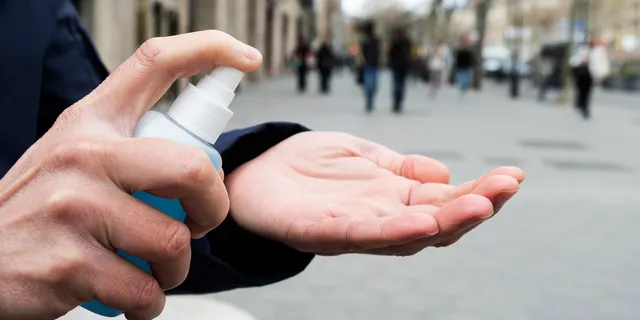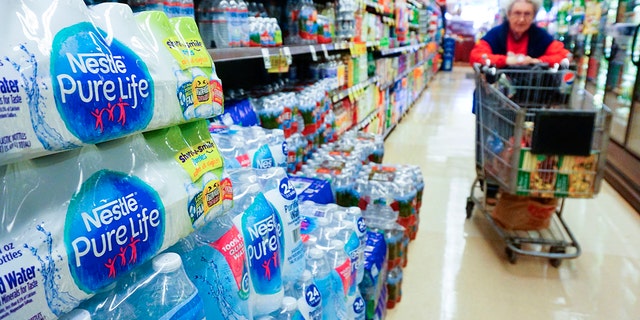Get all the latest news on coronavirus and more delivered daily to your inbox. Sign up here.
For those of you still wiping down groceries and other packages amid the ongoing coronavirus pandemic, breathe a sigh of relief: The Centers for Disease Control and Prevention (CDC) now says the novel virus “does not spread easily” from "from touching surfaces or objects" — but experts warn that doesn’t mean it’s no longer necessary to take "practical and realistic" precautions in stopping the spread of COVID-19.
Though it’s not clear exactly when, the federal health agency appears to have recently changed its guidelines from early March that initially said it “may be possible” to spread the virus from contaminated surfaces. The CDC now includes "surfaces or objects" under a section that details ways in which the coronavirus does not readily transmit.
CLICK HERE FOR COMPLETE CORONAVIRUS COVERAGE
Other ways in which the virus does not easily spread is from animals to people, or from people to animals, the federal agency said on its updated page.
“COVID-19 is a new disease and we are still learning about how it spreads. It may be possible for COVID-19 to spread in other ways, but these are not thought to be the main ways the virus spreads,” according to the CDC.
The CDC did, however, remind citizens that the virus does mainly spread person-to-person, noting that the virus that causes a COVID-19 infection, SARS-CoV-2, "is spreading very easily and sustainably between people.”

Maintaining a “good social distance," (keeping 6 feet away from others while in public), as well as washing hands often and “routinely” cleaning and disinfecting high-touch surfaces are still listed as key precautions.
More specifically, the agency said the virus primarily spreads person-to-person in the following ways:
- Between people who are in close contact with one another (within about 6 feet)
- Through respiratory droplets produced when an infected person coughs, sneezes, or talks
- These droplets can land in the mouths or noses of people who are nearby or possibly be inhaled into the lungs
- COVID-19 may be spread by people who are not showing symptoms
The change comes after a preliminary study from March suggested that the novel coronavirus can remain in the air for up to three hours, and live on surfaces such as plastic and stainless steel for up to three days, prompting many to take to wiping down packages and other items. However, at the time, the study was yet not peer-reviewed, and, as Yahoo notes, did not determine if people could be infected from touching certain surfaces analyzed in the study.
Dr. John Whyte, the chief medical officer for the healthcare website WebMD, called the CDC’s changes an “important step in clarifying how the virus is spread, especially as we gain new information.”
“It also may help reduce anxiety and stress. Many people were concerned that by simply touching an object they may get coronavirus and that’s simply not the case. Even when a virus may stay on a surface, it doesn’t mean that it’s actually infectious,” Whyte told Fox News in an email.

The news comes after The Food and Drug Administration in mid-April issued a statement saying that there’s no need to wipe down food packaging after you’ve returned home from the grocery store. (FREDERIC J. BROWN/AFP/Getty Images)
“I think this new guideline helps people understand more about what does and doesn’t increase risk. It doesn’t mean we stop washing hands and disinfecting surfaces. But it does allow us to be practical and realistic as we try to return to a sense of normalcy,” he added.
Dr. William Schaffner, the medical director of the National Foundation for Infectious Diseases (NFID) and professor at the Vanderbilt University School of Medicine, echoed Whyte.
“The virus that causes COVID-19 is thought to spread mainly through close contact from person-to-person (within about 6 feet). Person-to-person contact is a highway. Touching infected surfaces are little paths, but they don’t carry the big viral traffic,” he told Fox News in an email. “To reduce the spread of COVID-19, the safest thing is to continue social distancing, wear masks, and wash hands frequently and thoroughly.”
Indeed, the CDC on its updated page reiterated important steps to take to prevent exposure to the virus. Maintaining a “good social distance," (keeping 6 feet away from others while in public), as well as washing hands often and “routinely” cleaning and disinfecting high-touch surfaces were listed as key precautions.
“I think this new guideline helps people understand more about what does and doesn’t increase risk. It doesn’t mean we stop washing hands and disinfecting surfaces. But it does allow us to be practical and realistic as we try to return to a sense of normalcy."
CORONAVIRUS: WHAT YOU NEED TO KNOW
The news comes after The Food and Drug Administration (FDA) in mid-April issued a statement saying that there’s no need to wipe down food packaging after you’ve returned home from the grocery store.
“We want to reassure consumers that there is currently no evidence of human or animal food or food packaging being associated with transmission of the coronavirus that causes COVID-19,” the FDA said at the time.
A spokesperson for the CDC did not immediately return Fox News's request for comment on Wednesday.
"now" - Google News
May 21, 2020 at 12:31AM
https://ift.tt/2WMMN22
CDC now says coronavirus 'does not spread easily' via contaminated surfaces - Fox News
"now" - Google News
https://ift.tt/35sfxPY
Bagikan Berita Ini














0 Response to "CDC now says coronavirus 'does not spread easily' via contaminated surfaces - Fox News"
Post a Comment